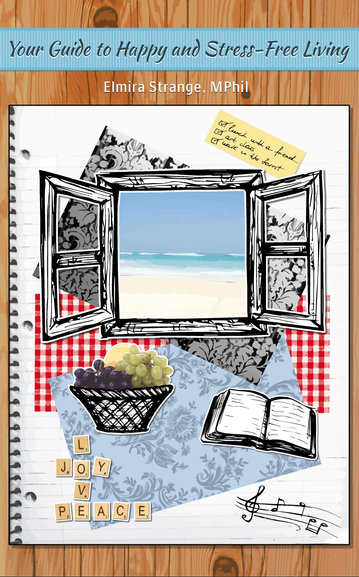How to be happy in this 'unhappy' world
by Elia Strange
"Happiness: a good bank account, a good cook,
and a good digestion"

To understand why you are unhappy – either generally or at the moment, you can read my other article 7 Main Reasons for our Unhappiness.
In this article, you can read about the solutions, or what we need to do to feel happier most days of our lives.
A word of caution first though: If you suffer from depression,
when you cannot see the meaning of your days and the reason for waking
up in the last several weeks or even months, you might need professional
help from a counsellor, psychotherapist, or your doctor.
I hope that
this article might give you some answers, but it is generally aimed at
people who are generally ok, but feel stressed and unhappy time to time
and who want to understand about it a bit more.
'How to be Happy':
1. “People create their own problems and obstacles, and then waste time and energy on overcoming them... How can we eliminate problems from our lives? Care without worrying” (Reality Transurfing, V. Zeland).
Don’t create more energy than you need to (i.e. don't worry too much). You cannot predict everything that might or might not happen. Talk to yourself (positively), reassure yourself, care for yourself... until you stop worrying and can accept the situation (and life in general) as it is.
2. When you have a problem or you are worrying about something or somebody, try to reduce its importance. “Importance is the only obstacle on the path to fulfilling your desire” (Reality Transurfing, V. Zeland).
Imagine the world to become small, to shrink. Then imagine looking at this world from above (as if you are the creator of this world). See thousands of people going on about their lives, going to work, arguing and complaining to each other. See others who struggle with living, who survive after some natural disaster, who live in poverty. Now, go back to your problems. How significant are they now?
3. Nobody has a right to judge you.
Your rights are equal to everyone else’s. You have the right to disagree and to be wrong. You have the right to have an opinion and to choose what you want. You have the right to be you.
4. “The return from your work must be the satisfaction which that work brings you and the world’s need of that work. With this, life is heaven, or as near heaven as you can get. Without this – with work which you despise, which bores you, and which the world does not need – this life is hell” (W. E. Burghardt du Bois).
Find work you enjoy doing.
“The highest possible stage in moral culture is when we recognise that we ought to control our thoughts” (Charles Darwin). Negative thinking can bring illness and disease. It can trap you in a viscous circle of ‘life is not worth living’ – ‘nothing I do is good enough’ – ‘what is the point of anything’.
Fears don’t grow, they multiply.
You have a power to change your thoughts. Talk to yourself as you would with your best friend.
5. Keep a diary or a journal of happy events in your life.
Start your writings with a good quote, a joke, or some interesting fact. Collect and attach some postcards from your trips to other places. Write a dialogue with the events and circumstances in your life, with your body and health, with your emotions and feelings. If you don’t know how to start your new entry, silence your thoughts and listen to your heart. Then start writing.
6. Write a List of 100.
Anything that is current issue for you is a good candidate for a List of 100. For example, you can write: “100 things I want and need to do”, “100 things I’ve accomplished in my life”, “100 ways I help others”, “100 things that turn me on”, “100 people I’d like to meet”, “100 places I’d like to visit”, “100 things I’m grateful for”, “100 ways I could nurture myself”, “100 things I’m good at”, and so on.
Don’t think too long, just write what pops up in your head. Writing these lists is a very soothing and uplifting process. You can also analyse them if you wish, by grouping the items into categories or themes, then categorising them into the ones that repeat throughout the list and the ones that emerged as new. You can also see which ones are important or urgent and which ones require careful planning.
7. Try Mindfullness.
Mindfullness is an ancient Buddhist practice which focuses on the present moment of our being. Whatever you do, detach yourself for a moment and see yourself as if you looking from above or aside. This is how you become conscious of whatever you are doing at that moment. Pay attention to what you do and what you say, how your actions affect your own body and how your words affect other people.
There are numerous books on this subject if you are interested. For example, “The Power of Now”, “Wherever You Go There You Are”, and so on.
8. “You grow up the day you have the first real laugh – at yourself” (E. Barrymore).
Have you noticed how much humour is based on people’s misfortunes? Laughter is the best response to life’s challenges. If you have some problem or have got yourself into some difficult situation, try to imagine yourself laughing about it some time later (or in a few weeks) after the event, for example, when telling your friends about it.
9.“I have never made but one prayer to God, a very short one: “O Lord, make my enemies ridiculous”. And God granted it” (Voltaire).
Norman Cousins was diagnosed with a ‘terminal illness’. He was given 6 months to live. His chance to recover from this illness was 1 in 500. He decided to experiment by treating himself with laughter and positive activities. He rented comedy movies and funny stories. He asked his friends to tell him jokes every time they see him or even phone him. He could not sleep because of the sheer pain he was in. When he started his ‘laughing therapy’, he found that laughing for 5 min reduced his pain for several hours. He fully recovered from the illness and died many years later at the age of 75. Don’t think laughter is a waste of time.
Use whatever makes you laugh – movies, sitcoms, books, cartoons, jokes, and friends. Laugh long and laugh out loud – whenever you find something funny.
Other articles you might be interested in:
Stop your irrational thoughts in 6 simple steps
7 Reasons for our unhappiness
How to solve a problem quickly
How optimistic are you? (Fun test)
'How to be happy' References:
Adams, K. (1990). Journal to the SELF: Twenty-two paths to personal growth. New York: Warner Books.
Kabat-Zinn, J. (2005).Wherever you go there you are: Mindfullness meditation in everyday life. New York: Kabat-Zinn, Jon.
Roger, J. & McWilliams, P. (1991). You can’t afford the luxury of a negative thought: A book for people with any life-threatening illness – including life! London: Thorsons Publishers.
Walmsley, C. (1991). Assertivenss: The right to be you. London: BBC Books.
Zeland, V. (2008). Reality Transerfing. Volume I: The Space of Variations. Washington: John Hunt Publishing Ltd.
Or follow me on Twitter and Google+ by clicking on the symbols below:
Sign
up below to receive my free email newsletter with new fresh articles to
help you to become healthier and happier.
It's sent about once a month.
No spam. No
sharing of your email address. Easily unsubscribe at any time.
Best Articles:
10 tips to strengthen your marriage
Best ways to manage your stress
How to get what you want (the Law of Attraction)
Why do I need to eat healthy?
Signs and stages of stress
13 Facts about sugar addiction
7 Reasons for our unhappiness
Why people commit suicide
How to get a good night sleep
Try these Tests and Quizzes:
Is it time to take stress seriously?
How well do you know yourself?
Can you talk to teenagers?
Do you have a time to recreate?
Can you cope with stress well?
The Latest Articles:
Green Smoothie Recipe
Stress in Parents and Carers of disabled children (VIDEO)
Did you find your dream job yet?
Is an eye mask good for sleeping?
How to look and appear confident
Why am I tired all the time?
Exercise tips: 8 easy ideas for losing weight and become fitter
15 Sure signs that you are stressed
Are memory foam mattresses worth it?
How stress affects your health: What stress is doing to your body
How to get what you want (the Law of Attraction)
How to be more patient
How to deal with SAD: Autumn depression
How to stop negative thinking
How bad is your memory? (Fun Quiz)
What is love - in children words
How to make people like you?
Why do I forget things?
10 Tips to strengthen your marriage
Would you move abroad?
Are holidays worth it?




New! Comments
Have your say about what you just read! Leave me a comment in the box below.